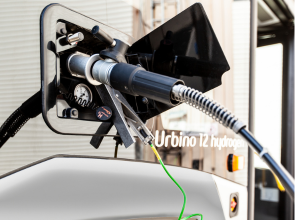Hydrogen Economy Weekly Review
California leads the US in supporting hydrogen fuel cell technology deployment, including development of hydrogen fueling infrastructure for fuel cell vehicles.

In North America, several announcements were made during the ACT Expo at Long Beach, California, last week. Chart Industries presented its new onboard liquid hydrogen fuel system, known as HLH2, manufactured and engineered at Chart’s Ball Ground, Georgia, facility, and tested at Chart facility in New Prague, Minnesota. The HLH2 system requires around half of the space and weight compared to H35 or H70 compressed hydrogen storage.
US-based GenH2 introduced its advanced technology, which can produce, store and dispense onsite carbon-free hydrogen. Air products showcased its hydrogen for mobility solutions to be used in heavy-duty transportation. As part of the earlier partnership, Cummins is responsible for supplying hydrogen fuel cell electric powertrains to Air Products that will be used in its hydrogen mobility solutions.
Hino Trucks presented its first Class 8 Hino XL8 prototype at ACT Expo, using hydrogen as a fuel source. The bus is a part of Project Z to develop zero-emission vehicles. The bus is equipped with two Toyota fuel cells.
Hexagon Purus and Ballard Power Systems announced a new collaboration to produce Class 6 & 7 Fuel Cell Electric Trucks powered by Hexagon Purus’ turnkey electric drivetrain and hydrogen storage system solutions and Ballard’s fuel cell module. The truck will provide a range of over 400 miles and refuelling times compared to conventional trucks. Hexagon Purus provides fully integrated electrified accessory systems and lightweight type 4 hydrogen storage systems, while Ballard provides an 8th generation fuel cell module known as FCmove.
Elsewhere, the US-based AAA Colorado partnered with New Day Hydrogen (NDH), under which both companies would be working to bring hydrogen-powered trucks and consumer vehicles to Colorado. Under the agreement, AAA Colorado would introduce tow trucks and other emergency rescue vehicles in Colorado, which would run on hydrogen. New Day Hydrogen will facilitate the designing and construction of hydrogen stations that will support the vehicles. The stations will also be open to public use in future.
US-based Nikola Corporation to use Bosch Group fuel cell power modules in its Class 7 and 8 fuel-cell electric vehicles (FCEV). Bosch is responsible for facilitating its fully assembled fuel-cell power modules and major components to Nikola, while Nikola will assemble the modules at its manufacturing facility in Arizona. The modules will launch in 2023 and will be the first use in Class 8 regional-haul Nikola Tre FCEV. The vehicle is expected to have a range of around 500 miles. Nikola also has planned to use the modules in Class 8 long-haul Nikola Two FCEV in the future, which will range up to about 900 miles.
In Europe, Norway-based Hynion AS announced a partnership with Premac to develop cost-effective hydrogen stations. Both companies have expertise in the development of fueling stations, Hynion has experience in developing hydrogen stations, while Premac has experience in developing fuel stations.
Anglo American announced the commissioning of its hydrogen fuelling station in Las Tórtolas floatation plant in the Colina, Chile. The fueling station can produce around 2 kg/day of hydrogen. The company is also working on developing its first hydrogen mining truck, aiming to be operational within two years.
Alexander Dennis announced to have won the competitive tender of facilitating Liverpool City Region Combined Authority with 20 zero-emission hydrogen double-deck buses in the UK. The buses will be ADL Enviro400FCEV buses and using ADL’s next-generation H2.0 platform, Ballard fuel cell power module and Voith Electrical Drive System. Liverpool City Region will buy the buses through the Transforming Cities Fund.
Sweden based SSAB announced an agreement with Mercedes-Benz AG. Under the agreement, SSAB will supply fossil-free steel to Mercedes-Benz, which will be used in prototype parts of its vehicles. The planning for using the first fossil-free steel in prototype parts for body shells is already in motion. Mercedes-Benz is expecting to produce CO2 neutral passenger car fleet by 2039.
Toyota announced the launching of its new hydrogen-powered Prius and Corolla models. It plans to launch a 1.8 litre Prius gasoline hybrid in December 2022, and a hydrogen-powered PHEV version in 2023. Furthermore, the company has also planned to launch a hydrogen-powered Corolla by 2023. It also announced that it would use its motorsport program to promote its hydrogen models by participating with hydrogen vehicles in the coming years.
Australia based H2X Global announced to launch its hydrogen fuel cell electric vehicle (FCEV), known as Warrego Ute, in November 2021. The vehicle will be the first hydrogen-based vehicle produced in Australia. The company has already started taking orders for the vehicle which would be equipped with 66KW and optional 90KW fuel cell systems, 200kW motor systems and 60 to 100KW output energy storage systems. It has a range of around 500 km.
Canada based Loop Energy agreed with Hydrogen In Motion (H2M) to convert diesel-electric switcher locomotive, owned and operated by Southern Railway, to hydrogen-electric. Both companies will use their locally developed technology modules such as Loop Energy’s 50 kW eFlow fuel cell system and H2M’s low-pressure solid-state hydrogen storage tank. H2M will also work with the University of British Columbia Okanagan School of Engineering (UBCO) and Southern Railway of BC to perform computational modelling for H2M low-pressure tanks and to compare hydrogen-electric powertrain performance with the previous diesel-electric locomotive.
In Russia, the Central Institute of Aviation Motors (CIAM) announced converting the Russian VK-2500 aero engine to hydrogen fuel. According to the company officials, the process will take around five years. The engine will be developed in cooperation with United Engine Corporation. The flight tests of the engine are expected to be performed using the Russian laboratory aircraft Yak-40LL.
